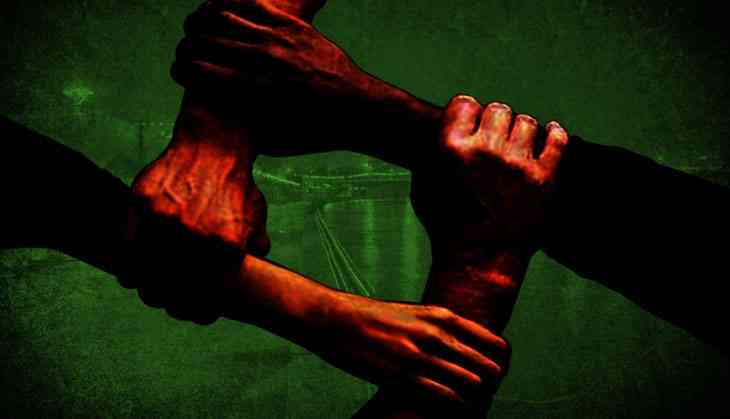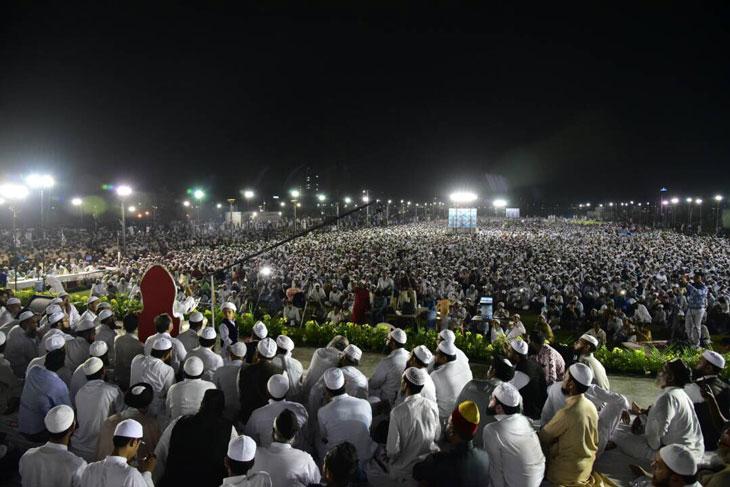SCs, STs, Muslims and Patidars come together in counter-narrative to BJP-RSS in Gujarat

More than 40,000 people - Muslims, Dalits, Patidars and Adivasis - from across Gujarat came together on 6 May on the riverfront in Ahmedabad, the nerve centre of Gujarat politics.
The effort to bring them all together for the 'Qaumi Ekta Sammelan' was made by various social organisations with the intent of highlighting how important it is for marginalised communities to support one another.
But a dilemma still stares them in the face: the absence of an elusive third alternative in Gujarat politics, particularly in light of the upcoming Assembly elections. The purpose of these events, the organisers said, is to prepare grounds for alternative politics without just looking at the 2017 Assembly polls.
At the event, a massive effort was made to debunk several RSS-BJP narratives that have been spread around Gujarat, a sate often referred to as the laboratory of Hindutva.
An important message

Jamiyat-E-Ulma-i-Hind was one of the main organisers at the event, one which saw addresses from religious leaders like Arshad Madni and Acharya Pramod Krishnam, besides other prominent social activists.
“There were some very important messages that we wanted disseminate particularly in light of the prevailing political atmosphere across the country after the results of the Uttar Pradesh state assembly polls. The BJP made a lot of tall claims on winning. Our very first message was that the idea of India with its distinct pluralism is still intact. It is not dead, as various organisations [BJP] are trying to project,” said Waqar Qazi, one of the organisers.
“The masses need to be told that the RSS and other affiliated organisations do not represent the entire Hindu community. Majority communalism is not at work in India. The BJP came to power with just 31% of the vote share and a majority of Hindus do not support the RSS and Sangh Parivar narrative on cow protection and vigilantism,” he said.
Patidar leader KD Sheladiya told Catch, 'In the present political atmosphere it is necessary to hold more and more such events to highlight how the government is not fulfilling it duty and is instead resorting to suppressing the marginalised communities when they are asking for their rights. One can look at the atrocities on Dalits in the Una episode where they were publicly flogged or the police action against the agitating Patidars. The government has brought about a law punishing cow slaughter with life imprisonment, but is quiet on those sell the bovines. The marginalised communities remain on the receiving end and must come together.”
The failures of the govt
Jayanti Makadiya of Gujarat Dalit Sangathan points out how there is a churning going on at the ground level to evaluate what the marginalised communities have gained and lost in the last more than two decades of the BJP rule in the state.
“Dalits, Adivasis and Patidars voted out the Congress as it was unwilling to acknowledge its shortcomings. They chose the BJP which has not addressed their concerns. It’s a story of 'kya khoya, kya paaya'. Over the years the people from these communities have become more aware and social media has further helped them connect with each other. This is the reason why the Samrasta (unanimity) programmes of the governments are failing in the villages because people do not want democratic institutions to die and things being imposed on them,” he said.
The BJP has been harping on the Samrasta concept whereby village panchayats and other institutions were given financial and other incentives if they chose their representatives unanimously. Critics have been denouncing this practice as anti-democratic, saying that leaves no space for dissent or different points of view.
But the moot question remains: what is the purpose of these programmes? They have failed to make any impact on the vote politics in the state.
While the Congress often pedals itself as an alternative to the BJP and RSS brand of politics, a large number of people from the marginalised communities stand disillusioned with it and treat it like the 'B' team of the BJP. To make matters worse, there is no strong third force in the state.
Pushed to the sidelines
Similar events were also held at certain intervals after the 2002 anti-Muslim pogrom where attempts were made to bring Dalits and Muslims together.
It is a well-known fact that these two communities that have existed side by side with similar socio-economic backgrounds were the worst sufferers in the riots that had followed the Godhra train burning incidents.
“This time you will see a change in the voting pattern. We are no longer the children of 2002. We have matured as adults of 2017,” says Makadiya.
Sheladiya points out that Gujarat needs a credible third force as this chunk of large number of people is desperately looking for a third alternative. One of the most intriguing part of Gujarat politics has been the failure of other parties who claim to be champions of the cause of the marginalised to fill the vacuum that exists in the state.
“We want a change in the system. The Congress has not functioned as the opposition in the state,” he says.
About the event, he says, “It was definitely a political event within the framework of the Constitution that can lay the path to political change. There will be changes in the voting patters. What remains to be seen is whether it will be in favour of the established forces or something else.”
First published: 8 May 2017, 17:17 IST

